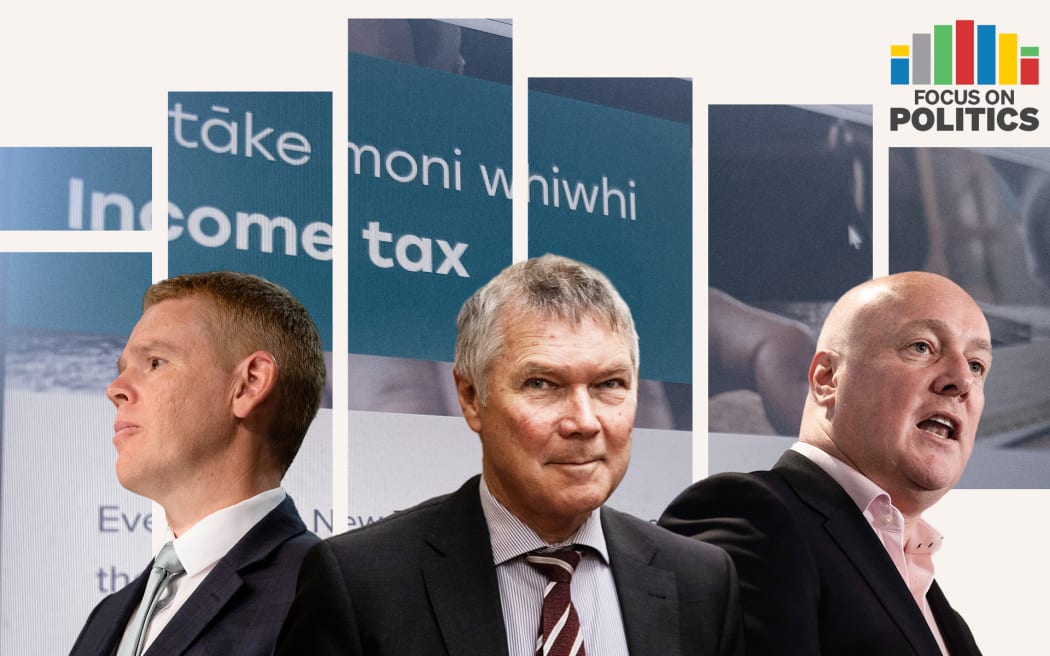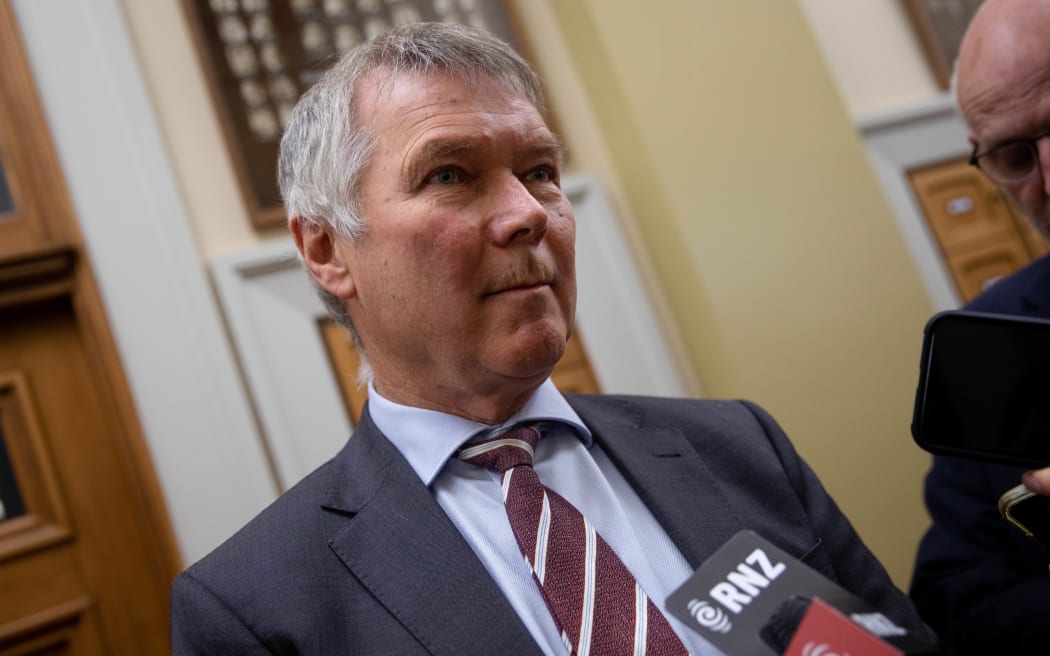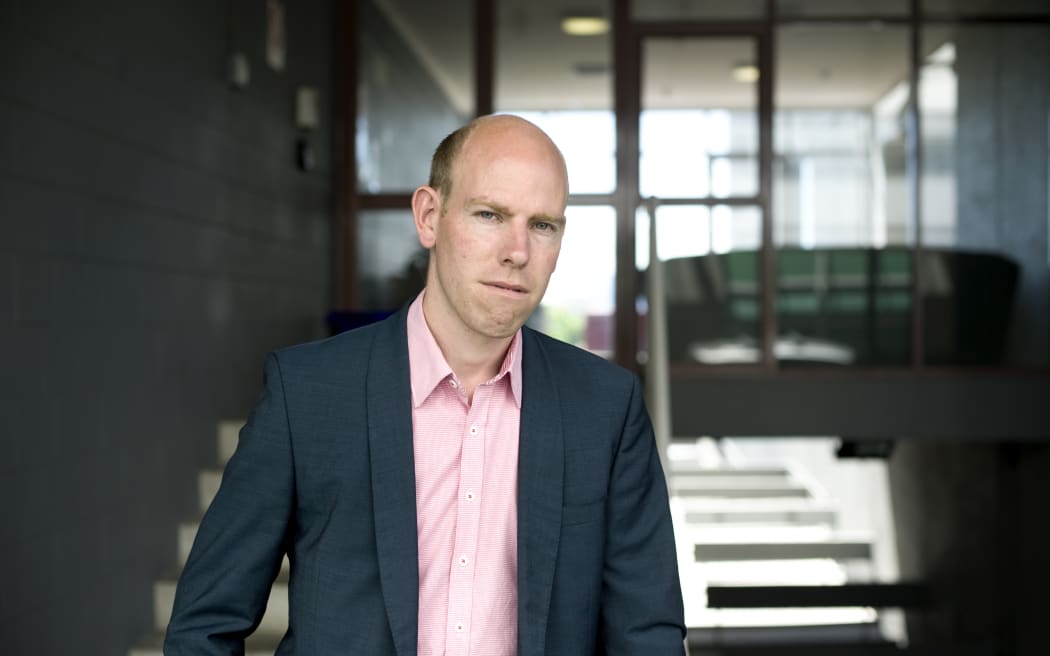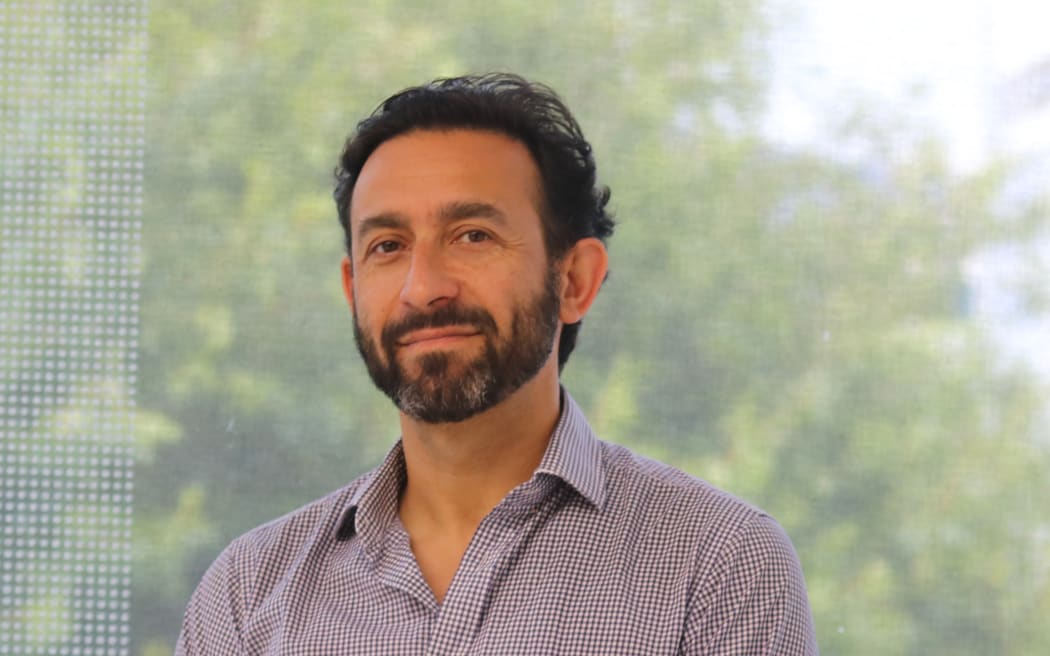
Chris Hipkins, David Parker and Christopher Luxon have been grappling with the findings of the IRD's tax report. Photo: RNZ
"When you're looking at potential changes to the tax system ... you have to have a mandate" - Chris Hipkins
Expectations are being kept very low for the 18 May Budget, so any surprises can have maximum political impact.
With a tight election looming, Labour will want to offer a proverbial carrot to voters - and could yet campaign on changes to the tax system after that milestone.
But staring down the unavoidable cost of recovering from Cyclone Gabrielle and tackling rising living costs, leader Chris Hipkins is touting this year's spend as "no frills" with a sharp focus on infrastructure.
Tax is fundamental to New Zealanders' lives - affecting people's and businesses earnings, and how much the government can spend on their behalf - and can dramatically impact equality across social strata.
Most New Zealanders' tax burden is relatively easy to define through income taxes - Pay As You Earn (PAYE) - but wages make up a relatively small portion of earnings for the richest New Zealanders, who also earn through property, business, and investments.
In 2020, Revenue Minister David Parker changed the law in 2020 to allow the department to track down earnings information from New Zealand's 311 richest families. Between them they have a collective wealth of $85 billion, and much of that - 67 percent - is tied up in trusts.

Revenue Minister David Parker made a speech highlighting inequity at the release of the IRD report and an accompanying one by Treasury on Wednesday. Photo: RNZ / Angus Dreaver
The resulting report from Inland Revenue on Wednesday has one major message: the wealthiest New Zealanders pay effective tax of 9.4 percent on earnings, compared to the 20.2 percent of middle New Zealand.
It's a disparity that may smack of unfairness for many, and offers a vehicle for Labour to again campaign on changes to the tax system. Speaking at the report's release however, Parker quickly rules out any immediate "new tax policy or tax switch".
Read more:
- Wealthiest pay tax at much lower rate than most NZers - IRD
- Budget 2023: Borrowing may be 'sacrificial lamb' for government
- Political Editors panel: Wealth, tax, and the Budget
- Luxon: Labour's no-frills pre-Budget commitment 'too little, too late'
- No cyclone levy, capital gains or wealth tax in Budget - Hipkins
- Capital gains tax back in the spotlight after IRD report
- Rich-lister supports capital gains tax after new research
- Tax specialists warn over intricacies of capital gains tax
Opposition parties have been quick to lay the blame at the feet of the government. National's Christopher Luxon rails against the Labour's economic approach, saying the real unfairness was to be seen in rising inflation.
"It's all a little too little, too late, frankly," he says. "Again, four months out from an election, Chris Hipkins has all of a sudden discovered that actually controlling and being disciplined spending of taxpayer money is actually important. Well, it's always been important."
ACT leader David Seymour points out benefit payments were not accounted for as "negative tax" and those richest families were responsible for paying a large proportion of the total tax take.
On the left, Green MP Chloe Swarbrick said the report created "crystal clear grounds" for a fairer system.
Te Pāti Māori co-leader Rawiri Waititi described the level of disparity as shocking, saying many people probably would not know just 2 percent of New Zealanders controlled half the country's wealth.
Council of Trade Unions economist Craig Renney casts the report as revealing what we already knew, saying the real surprise in the report is the size of the gap between the super-rich and the average Kiwi.
Income equality expert Max Rashbrooke, a senior associate from Victoria University of Wellington, takes a similar view.
"New Zealand's tax laws are not fit for purpose because, unlike almost every country in the developed world, we don't tax capital gains - even though capital gains are income just like my salary is income," he says.

Max Rashbrooke Photo: supplied
Rashbrooke argues the IRD report makes a case for change, with the most obvious solution being towards a capital gains tax - "but, you know, Labour has bad memories of its last attempt to try to bring that into law".
A CGT takes a percentage of the profits from the sale or transfer of significant assets - like a house. The bright-line test introduced by National and extended under Labour captures some capital gains on property, but there have long been strong calls - including from the Greens - for a more comprehensive approach.
A succession of Labour leaders have however struggled to find enough support to get one passed, either with voters - like David Cunliffe in the face of John Key's derision - or, in Jacinda Ardern's case, with coalition partners NZ First. She afterwards ruled out further campaigning on a CGT in her time as leader.
Hipkins' rise to the leadership has brought it back into contention - but, like Parker, his pre-Budget speech on Thursday merely ruled out major changes in the Budget or the rest of the Parliamentary term. This leaves room for a campaign on significant tax policy ahead of the October election - but Hipkins refused to enlighten voters just yet.
The Opportunities' Party leader Raf Manji is campaigning instead on a tax switch - targeting land instead of housing.
"What we want to do is we want to switch the burden of tax away from income, because we want people to earn and keep more of the money that they earn .. and we want to shift the burden onto land - not housing or businesses, but land - because that's where a lot of the value accrues and where a lot of wealth is held.

TOP leader Raf Manji Photo: RNZ / Katie Todd
"That's wealth that's not earned; that's wealth that is delivered by location values, by public infrastructure, by land supply issues."
Another option could make changes to tax brackets. National has been campaigning on lifting them automatically in line with inflation - a cut leaving more in New Zealanders' pockets and less on the government's balance sheet.
Hipkins acknowledges the financial pressure facing New Zealanders makes a compelling case for raising the thresholds eventually - but says now is not the time, criticising such a move as inflationary.
Efforts to trim government spending and curb that inflationary pressure are ongoing, but the Cyclone Recovery - estimated at between $9 billion and $14.5b will only add to it.
The Budget then will be a hurdle for Labour, which will be tempted to include enough sweetness to attract voters and make up for sourness of rising costs and a disastrous storm.
In this week's Focus on Politics, Political Editor Jane Patterson examines the impetus and politics behind renewed calls for major tax changes.
Listen free to Focus on Politics on Apple Podcasts, on Spotify, on iHeart Radio or wherever you get your podcasts.


